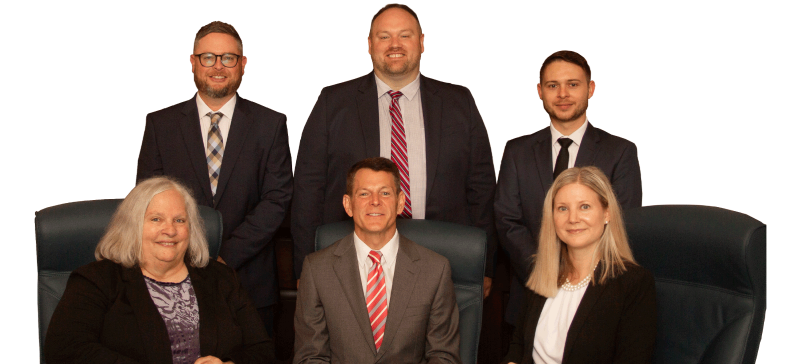Drug Injury Attorney
Why You Need Drug Injury Lawyers
 Given the extensive vetting process, most medicines used by consumers are safe. Though the risks are low, the costs of drug injury are high. If a defective drug or medical device reaches consumers, it is likely to cause significant harm, even death.
Given the extensive vetting process, most medicines used by consumers are safe. Though the risks are low, the costs of drug injury are high. If a defective drug or medical device reaches consumers, it is likely to cause significant harm, even death.
When serious injuries occur, an experienced legal team understands your legal options for recovering compensation for medical bills, lost wages, and suffering.
How does this happen if the FDA approval process for each new drug includes lengthy clinical trials, research, and expert review?
The most common cause of injuries happens after the Food and Drug Administration has approved new drugs or medical devices. Drug manufacturers, doctors, and pharmacists sometimes fail to provide appropriate information on a drug’s risks.
Companies may also market, and doctors prescribe, medications for a purpose not approved by the FDA. The victim suffering harm typically has no idea of the risks of the prescribed medication.
If a defective drug has injured you or a loved one, our team of drug injury lawyers is here to help.
Not all law firms have the experience needed to win your case. Reach out today for a free consultation at 888-709-9329.
Types of Compensation for a Dangerous Drug Injury Claim
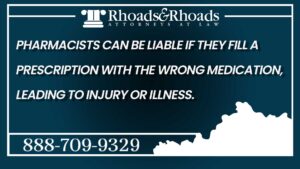 When a person suffers an injury due to a dangerous or defective drug, they may be entitled to compensation through a drug injury claim.
When a person suffers an injury due to a dangerous or defective drug, they may be entitled to compensation through a drug injury claim.
When drug companies fail to keep you safe, there are three types of damages: economic, non-economic, and, in some cases, punitive.
Economic damages from a dangerous drug claim, class action lawsuit, or wrongful death case cover the direct financial losses, including:
- Medical expenses: This encompasses past and future medical bills such as doctor’s visits, hospital stays, surgeries, medications, and rehabilitation therapies.
- Lost wages: If the pharmaceutical injury has caused the victim to miss work, they can recover compensation for the income lost during the recovery period.
- Loss of earning capacity: If they experience a long-term or permanent disability, victims may be entitled to a fair settlement related to the amount they can no longer earn.
- Other out-of-pocket expenses: Costs related to travel for medical treatments, modifications to the home to accommodate disabilities, and any other incidental costs directly related to the injury.
Non-economic damages compensate for the more subjective, non-financial impacts of the injury, including:
- Pain and suffering: The physical pain endured due to the injury.
- Emotional distress: This includes anxiety, depression, PTSD, and other psychological impacts stemming from the injury.
- Loss of consortium: The impact of the injury on the victim’s relationship with their spouse or family, including loss of companionship and support.
- Diminished quality of life: If the injury significantly affects the victim’s ability to enjoy life or perform daily activities, they may receive compensation for this loss.
If the actions were malicious, fraudulent, or grossly negligent, punitive damages may be awarded to punish the defendant for particularly egregious conduct and deter similar future behavior.
To seek compensation for common injuries related to a dangerous drug, speak with a pharmaceutical injury lawyer today at 888-709-9329 or contact us by email.
Factors Influencing Compensation
The amount of financial compensation a victim may receive from a pharmaceutical company, pharmacy, or doctor depends on several factors, including:
- The severity of the injury.
- The impact of the injury on the victim’s life and ability to work.
- The degree of negligence of the drug manufacturer.
- The availability and strength of evidence supporting the claim.
- Whether they are part of a class action lawsuit or filing independently.
An experienced dangerous drug attorney can secure the compensation their clients deserve. Call our drug injury law firm today at 888-709-9329 to discuss pharmaceutical litigation or a class action suit.
What Are Dangerous and Defective Drugs?
Dangerous drugs and defective drugs are medications that cause harm to patients due to inherent defects, contamination, or inadequate warnings about potential side effects.
Categories of Dangerous and Defective Drugs That Often Lead to a Class Action Lawsuit
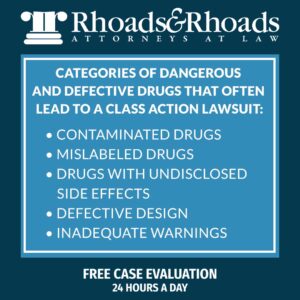 Contaminated Drugs: Drugs that are tainted during the manufacturing process. Contamination can occur due to poor manufacturing practices, unclean facilities, or inadequate quality control.
Contaminated Drugs: Drugs that are tainted during the manufacturing process. Contamination can occur due to poor manufacturing practices, unclean facilities, or inadequate quality control.- Mislabeled Drugs: Medications that provide false ingredient information or omit critical warnings about side effects, interactions, or usage instructions.
- Drugs with Undisclosed Side Effects: Some medications are released to the market without adequate disclosure of all potential side effects. Patients may suffer because they were not adequately informed of serious health risks.
- Defective Design: Defective drugs that are inherently unsafe due to their chemical composition or delivery method. Even when manufactured correctly, these drugs can cause harm due to flaws in their design.
- Inadequate Warnings: A prescription drug that does not come with a precise dosage, potential interactions with other drugs, and necessary precautions for specific populations (e.g., pregnant women and children).
Dangerous drug attorneys can help victims understand the categories and examples of these harmful medications.
This understanding is especially helpful when determining whether you are eligible to participate in a class action lawsuit related to a drug or medical equipment.
Examples of Dangerous and Defective Drugs from Big Pharmaceutical Companies
- Opioids: Drugs like OxyContin, Vicodin, and Fentanyl have been linked to widespread addiction and overdose deaths due to their highly addictive nature and the aggressive marketing tactics used by pharmaceutical manufacturers.
- Antidepressants: Medications such as Prozac, Zoloft, and Paxil have been associated with increased risks of suicidal thoughts and behaviors, especially in adolescents and young adults.
- Heartburn Medications: Proton pump inhibitors (PPIs) like Prilosec and Nexium have been linked to kidney disease, bone fractures, and other serious health issues with long-term use.
- Diabetes Medications: Drugs such as Actos and Invokana have been found to increase the risk of bladder cancer, heart attack, and severe urinary tract infections.
- Weight Loss Drugs: Medications like Belviq have been recalled due to an increased risk of cancer among users, while diet pills filled with stimulants can have serious cardiac side effects.
- Blood Thinners: Using a defective drug like Xarelto and Pradaxa has been associated with severe bleeding events, some of which have been fatal, due to the lack of a readily available antidote.
Remember, not all law firms have the experience to win individual or class action lawsuits.
Call our experienced dangerous drug injury lawyer today at 888-709-9329 or contact us by e-mail to discuss your drug injury case.
Who Is Liable for Prescription Drug Damages?
Drug Manufacturers/Pharmaceutical Companies
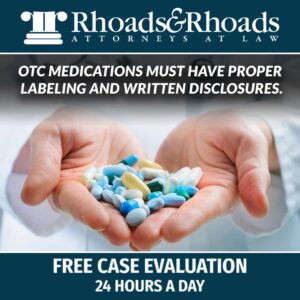 OTC medications must have proper labeling and written disclosures, while prescription drugs require the manufacturer to inform doctors of all associated risks.
OTC medications must have proper labeling and written disclosures, while prescription drugs require the manufacturer to inform doctors of all associated risks.
Doctors
Prescribing doctors are liable if they fail to inform patients of all risks associated with a medication so that the patient can make an informed decision.
Pharmacists
Pharmacists can be liable if they fill a prescription with the wrong medication, leading to injury or illness. With the rise of online pharmacies, it’s crucial to ensure drugs are obtained from reputable sources following FDA guidelines.
How Do You Determine Whether Pharmaceutical Companies Are Liable for a Dangerous Drug?
Determining the liability of a drug company in a drug injury case requires proving that the drug in question had a:
- Design defect
- Manufacturing defect
- Insufficient labeling that directly caused the injury
Liability can also be established by showing that the drug company engaged in negligence or misconduct by:
- Failing to conduct thorough testing
- Concealing known risks
- Misrepresenting the safety of the drug
For a successful claim, it is essential to link the defective drug directly to the injury, showing that the harm would not have occurred if the drug had been adequately designed, manufactured, or labeled.
Think you might be part of a class action suit? Call the Rhoads & Rhoads law firm today at 888-709-9329 for a free consultation, or contact us by email.
Kentucky’s Drug Injury Statute of Limitations
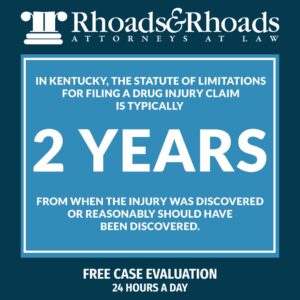 In Kentucky, the statute of limitations for filing a drug injury claim is typically two years from when the injury was discovered or reasonably should have been discovered. This timeframe is crucial in a drug injury lawsuit as it sets the deadline for victims to initiate legal action against the drug manufacturer or other liable parties.
In Kentucky, the statute of limitations for filing a drug injury claim is typically two years from when the injury was discovered or reasonably should have been discovered. This timeframe is crucial in a drug injury lawsuit as it sets the deadline for victims to initiate legal action against the drug manufacturer or other liable parties.
It’s important to note that this two-year period can vary depending on the case’s specifics. For instance, if the injury resulted in death, the statute of limitations might start from the date of death.
Additionally, exceptions or extensions can be granted in certain circumstances, such as cases involving minors or where the injury was not immediately apparent.
Call a Rhoads & Rhoads drug injury lawyer at 888-709-9329 to determine if you can obtain financial compensation for injury-related expenses.
Types of Injuries from Dangerous Medication
Dangerous medications can cause a wide range of serious injuries, varying from mild to life-threatening.
Some common types of injuries include:
- Severe allergic reactions
- Birth defects
- Heart attack
- Blood clots
- Strokes
- Uncontrollable bleeding
- Organ damage
- Cardiovascular issues
- Neurological disorders
- Chronic kidney disease
- Mental health conditions like depression, anxiety, or PTSD
Severe injuries caused by dangerous drugs can significantly impact a victim’s quality of life, requiring extensive medical treatment and ongoing care.
Sadly, sometimes dangerous drugs can be fatal, and pharmaceutical litigation is the best way to make sure drug companies are held responsible.
Call Rhoads & Rhoads dangerous drug lawyers today at 888-709-9329 to discuss compensation for your injuries. Our law firm is here to fight for you.
Long-Term Effects of Dangerous Medication
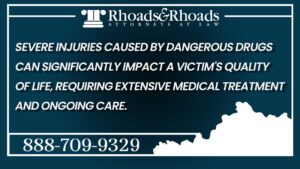 The adverse long-term effects of using dangerous or defective medications can be devastating and far-reaching.
The adverse long-term effects of using dangerous or defective medications can be devastating and far-reaching.
They may include:
- Chronic pain and disability: Many drug injuries result in long-term pain or permanent disability, limiting mobility and the ability to perform everyday tasks.
- Decreased quality of life: Persistent pain, disability, and mental health issues can limit the ability to enjoy hobbies, social activities, and overall life satisfaction. The inability to participate in previously enjoyed activities can lead to a sense of loss and decreased fulfillment.
- Strain on relationships: The emotional and physical toll can strain relationships with family and friends, sometimes leading to social isolation.
- Loss of independence: Physical limitations and the need for constant care can lead to feelings of helplessness and a loss of personal independence, contributing to emotional distress.
In the most severe drug injury cases, these long-term effects can result in wrongful death, leaving families to cope with the loss and pursue justice while grieving their loved ones.
Contact Rhoads & Rhoads Drug Injury Lawyers-No Recovery, No Fee
 Our compassionate drug injury lawyers in Owensboro and Madisonville, represent drug injury victims and those in our community left behind in a wrongful death claim. We always offer a free legal consultation.
Our compassionate drug injury lawyers in Owensboro and Madisonville, represent drug injury victims and those in our community left behind in a wrongful death claim. We always offer a free legal consultation.
You pay nothing unless we win your case, offering access to justice for all. We fight for you, not just in court, but in every interaction, championing your rights against large companies.
Call our supportive law firm at 888-709-9329 for a free consultation, or contact us by e-mail to schedule an appointment with one of our Madisonville or Owensboro dangerous drug injury attorneys.


